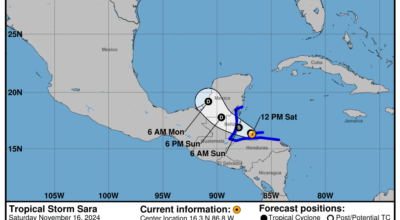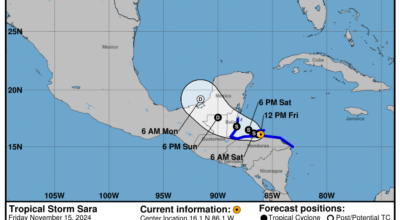Category 1 Hurricane Francine: Wednesday, Sep 11 update from the National Hurricane Center on latest developments
Published 1:49 pm Wednesday, September 11, 2024
Article first published: Wednesday, Sep. 11, 2024, 4 a.m. ET
Article last updated: Wednesday, Sep. 11, 2024, 1 p.m. ET
According to the National Hurricane Center’s 1 pm Wednesday advisory, Category 1 Hurricane Francine is 95 miles southwest of Morgan City Louisiana and 155 miles southwest of New Orleans Louisiana, with maximum sustained wind of 90 mph. It’s moving 16 mph to the northeast.
“After landfall, the center is expected to cross southeastern Louisiana tonight, then move northward across Mississippi on Thursday and Thursday night.” according to forecasters. “Little change in strength is expected before landfall.” They also said “Francine is expected to rapidly weaken after landfall, and the system is forecast to become post-tropical on Thursday.”
YESTERDAY (Tuesday):
Yesterday, the tropical storm Francine developed into a Category 1 hurricane with winds of 90 miles per hour.
Eastward along the Louisiana coast under a hurricane warning, forecasters report.
CHANGES WITH THIS ADVISORY:
The Tropical Storm Warning has been discontinued for the southwestern coast of Louisiana west of Cameron.
SUMMARY OF WATCHES AND WARNINGS IN EFFECT:
A Storm Surge Warning is in effect for:
– Cameron Louisiana to the Mississippi/Alabama Border
– Vermilion Bay
– Lake Maurepas
– Lake Pontchartrain
A Hurricane Warning is in effect for:
– The Louisiana coast from Vermilion/Cameron Line eastward to Grand Isle
A Hurricane Watch is in effect for:
– Lake Maurepas and Lake Pontchartrain, including metropolitan New Orleans
A Tropical Storm Warning is in effect for:
– Louisiana coast from Cameron to the Vermilion/Cameron Line
– East of Grand Isle Louisiana to the Alabama/Florida border
– Lake Maurepas and Lake Pontchartrain, including metropolitan New Orleans
A Storm Surge Warning means there is a danger of life-threatening inundation, from rising water moving inland from the coastline, beginning shortly for the indicated locations.
For a depiction of areas at risk, please see the National Weather Service Storm Surge Watch/Warning Graphic, available at hurricanes.gov. This is a life-threatening situation. Persons located within these areas should take all necessary actions to protect life and property from rising water and the potential for other dangerous conditions. Promptly follow evacuation and other instructions from local officials.
A Hurricane Warning means that hurricane conditions are expected somewhere within the warning area in the next few hours.
Preparations to protect life and property should be completed.
A Hurricane Watch means that hurricane conditions are possible within the watch area, in this case within 12 to 24 hours.
A Tropical Storm Warning means that tropical storm conditions are expected somewhere within the warning area, in this case within 12 to 24 hours.
HAZARDS AFFECTING LAND:
WIND: Hurricane conditions are expected within the hurricane warning area in the next few hours, with tropical storm conditions ongoing. Hurricane conditions are possible in the hurricane watch area later this afternoon and tonight.
Tropical storm conditions are expected in the warning area along the coasts of Louisiana, Mississippi, and Alabama this afternoon and tonight.
RAINFALL: Francine is expected to bring storm total rainfall of 4 to 8 inches, with local amounts to 12 inches across southeastern Louisiana, Mississippi, far southern Alabama and the Florida Panhandle through Thursday night. This rainfall could lead to considerable flash, urban and river flooding.
For a complete depiction of forecast rainfall associated with Francine, please see the National Weather Service Storm Total Rainfall Graphic, available at hurricanes.gov/graphics_at1.shtml? Rainqpf and the Flash Flood Risk graphic at hurricanes.gov/graphics_at1.shtml? Ero.
For a list of rainfall observations (and wind reports) associated this storm, see the companion storm summary at WBCSCCNS1 with the WMO header ACUS41 KWBC or at the following link: www.wpc.ncep.noaa.gov/discussions/nfdscc1.html.
STORM SURGE: The combination of a dangerous storm surge and the tide will cause normally dry areas near the coast to be flooded by rising waters moving inland from the shoreline. The water could reach the following heights above ground somewhere in the indicated areas if the peak surge occurs at the time of high tide…
Intracoastal City, LA to Port Fourchon, LA…5-10 ft Vermilion Bay…5-10 ft Port Fourchon, LA to Mouth of the Mississippi River, LA…4-7 ft Mouth of the Pearl River, LA to Ocean Springs, MS…4-6 ft Lake Pontchartrain…4-6 ft Ocean Springs, MS to MS/AL Border…3-5 ft Cameron, LA to Intracoastal City, LA…3-5 ft Lake Maurepas…3-5 ft
The deepest water will occur along the immediate coast near and to the east of the landfall location, where the surge will be accompanied by large and dangerous waves. Surge-related flooding depends on the relative timing of the surge and the tidal cycle, and can vary greatly over short distances. Storm surge is not expected to pose a threat to the risk reduction system levees. However, there may be some overtopping of local levees.
For a complete depiction of areas at risk of storm surge inundation, please see the National Weather Service Peak Storm Surge Graphic, available at hurricanes.gov/graphics_at1.shtml? PeakSurge.
TORNADOES: A few tornadoes are possible this afternoon and tonight across parts of southeast Louisiana, southern Mississippi, southern Alabama, and the Florida Panhandle.
SURF: Swells generated by Francine are affecting much of the northern and northwestern Gulf Coast, likely causing life-threatening surf and rip current conditions.
Source: National Hurricane Center





